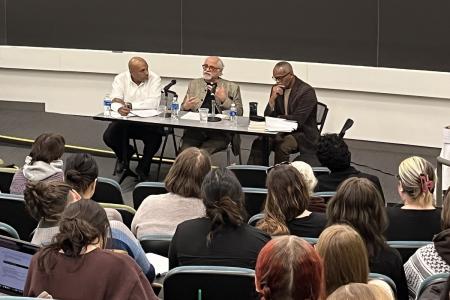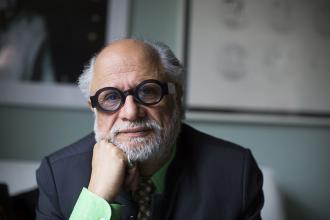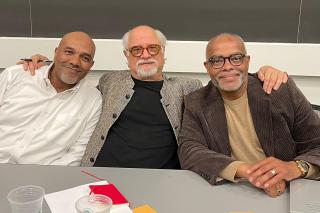On April 25, the Department of Literature & Writing welcomed Professor Homi K. Bhabha, the Anne F. Rothenberg Professor of the Humanities at Harvard University, as this year’s featured speaker for the Robert M. Gay Memorial Lecture. In his conversation with Simmons faculty and students, Bhabha emphasized the importance of dialogue with people from different backgrounds and points of view on their terms. Professor Sheldon George and Assistant Professor Patrick Sylvain served as moderators, and the event concluded with a book signing of Bhabha’s key texts.
The Robert M. Gay Memorial Lecture, currently co-sponsored by the Gwen Ifill College of Media, Arts, and Humanities, the Office of Undergraduate Research and Fellowships, and Eileen Friars, is an esteemed lecture series that began in the 1960s. Held annually, this event honors Professor Robert Malcolm Gay (1879–1961), a longtime Simmons faculty member who founded the English Department in 1930. He (co-)authored several books, including Writing through Reading (1920), Emerson: A Study of the Poet as Seer (1928), and Word into Type (1948). Professor Gay believed that a focused study of literature and writing could catapult women’s professionalization in diverse fields and occupations. As he told The New York Times in 1936, “The thing [that] gets [women] jobs is the ability to write clearly and interestingly . . . A general knowledge of literature and the arts, a solid foundation in the sciences, and an interest in public affairs will give this ability free play.”
This year’s featured lecturer, Homi K. Bhabha, the Anne F. Rothenberg Professor of the Humanities at Harvard University, is a trailblazing humanist and “one of the founding thinkers of postcolonial theory,” said Sheldon George, Professor and Chair of the Department of Literature & Writing. Bhabha’s seminal and wide-ranging scholarship has shaped cultural studies, literary theory, psychoanalysis, feminist studies, migration studies, visual studies, and beyond.
Reconceptualizing Postcolonial Studies
Assistant Professor Patrick Sylvain introduced Bhabha’s oeuvre, paying close attention to critical concepts. As Sylvain explained, a hallmark of Bhaba’s approach to colonialism is “to reveal the intimate interplay of colonizer and colonized, self and the Other.”
Sylvain continued by unpacking three key terms within Bhabha’s scholarship. Hybridity refers to “the blending of cultures, identity, and perspective that occurs when different cultural elements interact and intersect.” This phenomenon challenges “the notion of pure, static identities, and instead highlights the fluid and dynamic nature of cultural exchange.”
The second key term, mimicry, “is a strategy employed by the colonized to imitate or mimic the culture and behavior of the colonizer,” said Sylvain. “However, this mimicry is never exact or complete; instead, it involves a subtle subversion or distortion of colonial norms and values,” thereby revealing the colonized assertion of agency. In Bhabha’s critical framework, the term “refers to a simultaneous attraction and repulsion that characterizes colonial relationships . . . in which the colonized may both desire and reject aspects of the colonizers’ culture and power.”
This complex terminology underpins Bhabha’s principal contribution to postcolonial studies. Rather than reinforcing a sharp dichotomy between the colonizer and the colonized, Bhabha’s work — most notably his 1994 essay collection The Location of Culture — invites readers to apprehend and interrogate “the in-between spaces, the liminal zones where identities are forged and contested,” said Sylvain. According to Sylvain, Bhabha’s concept of “The Third Space” (a creative and discursive space between the dominant subject and the oppressed subject) offers “a conceptual toolkit to navigate the complexities of cultural negotiation” and to “embrace hybridity in a productive way.” In essence, Sylvain said, “Bhabha’s work serves as a blowhorn of intellectual courage, urging us to question, to challenge, to reimagine the world around us.”
Bhabha’s Simmons lecture derived from a work-in-progress entitled “The Burdened Life: On Migration and the Humanities.” Fittingly, Bhabha presented his thoughts in a conversational format that engaged intermittent interventions from Sylvain and George, who had read the paper in advance.
Dissecting the Dialogic

“One of the most important things is to know how to negotiate difficult conversations,” said Professor Bhabha as he began his lecture.
For Bhabha, the art of conversation does not necessarily privilege agreement with another. “When you say something, you are in a position of authorization — you are the author — and you aim to communicate something. But when you address me as ‘I,’ for me it turns into a ‘You’ . . . [In other words,] you must swivel into that other position,” he said. Despite the differentials between I and You, in terms of power, education, gender, ability, and race, Bhabha emphasized the speaker’s need to tend to this flexibility; he refers to conversational, dialogue-based exchange as “dialogic.”
In Bhabha’s view, social media encapsulates both the potential for, and the crisis of, the dialogical. In theory, social media may showcase and disseminate different points of view. But the problem, according to Bhabha, is that social media “is entirely unregulated, and thrives by the capitalization of rumor and horror.” Thus, people use the mechanism to validate their own views, ultimately forming “pods” of like-minded, self-affirming individuals and perspectives. Here “the I-You reversibility disintegrates, eliminating the productive tension [of conversation],” observed Bhabha.
“The real challenge is when the conversation gets hot . . . how can we continue with difficult conversations and start again in the middle?” Bhabha elaborated that conversations should not revolve around a desired endpoint. Rather they are “about how you keep changing places, even when you don’t agree. . . . Otherwise, there is no point in listening to one another.”
At this point in Bhabha’s talk, Professor Sylvain asked about authoritarian leaders and regimes that pervert and stymie the dialogical atmosphere. “There is always some element of agency, unless you are dead,” responded Bhabha. He also cautioned against disregarding this mode of discourse, as hearing an authoritarian voice — however misleading and deceitful — may be deeply comforting for people who otherwise feel feeble and confused.
And this is where the humanities enter public discourse. In our geopolitically tumultuous world, Bhabha believes that the humanities facilitate the dialogic, creating a meaningful interplay between solidarity and plurality. “The goal is to build arguments together, not to win arguments by ourselves.”
Articulations of Agency
Throughout his lecture, Bhabha stressed the importance of intentional action, rather than the result or reward that may follow it. “Agency is not only about getting things done,” he said. “It is about feeling that you have the dignity to reach out to get things done. Don’t diminish an effort because it was not successful or a conversation because it did not go your way. Standing up to the tension of alterity is where the moral fiber lies.”
The German philosopher Hannah Arendt (1906–1975) exemplified this particular articulation of agency. In her 1963 book, Eichmann in Jerusalem: A Report on the Banality of Evil (based on a series of essays for The New Yorker magazine), she covered the trial of Nazi leader Adolf Eichmann. Controversially, Arendt argued that although Eichmann had committed war crimes, kidnapping him from another country (he had absconded to Argentina after the war) and bringing him to yet another country and jurisdiction (Israel) to stand trial constituted a breach of international law. “Arendt’s position made her extremely unpopular among the New York Jewish community,” explained Bhabha. “Nevertheless, I admire Arendt’s courage for putting the point out there. She had the ability to self-interrogate, despite being Jewish herself.”
To further substantiate his claim that the humanities can engender the dialogic, Bhabha noted that Arendt was especially interested in Socrates and the Socratic dialogues. These kinds of texts open up space for self-reflection and self-questioning.
One of Professor George’s interventions involved psychoanalysis. He explained that Bhabha’s discussion tied the humanities to discourse and self-awareness because, for Bhabha, dialogue grounds our sense of morality, making us aware not only of ourselves but also of others we may denigrate. Since Bhabha’s work “can take us beyond language,” Professor George inquired about the role of the unconscious, which George suggested may evade a morality grounded in conscious use of language and may retain the kind of hatred Bhabha seeks to combat. Bhabha answered that the unconscious can renegotiate the divide between self and Other: “The unconscious is a change of time in your person that is temporarily illegible to you, but compels you. And something can be registered here in the moment of self-interrogation.” Moreover, Bhabha insists that psychoanalysis is not a “talking cure.” Rather, its curative properties arise from listening and hearing.
During the Q&A segment with Simmons students, Bhabha mapped insights from postcolonial theory onto a contemporary context. “Today, political moments (e.g., #MeToo, Occupy Wall Street, #BlackLivesMatter) may be ephemeral and leaderless. But they still function as a moral compass for many of us. I believe that these moments have the potential to enact a productive space — a Third Space political movement.”
In conclusion, Bhabha implored the audience to rethink old methods of negotiation. “There are so many cracks and splits that we don’t have a Third Space at the moment, and our demands cannot be resolved promptly and efficiently. . . . We now need to think about time, politics, and negotiation as a process rather than an end goal. And here ‘occupy’ constitutes a performative enacting of politics.”
About Homi K Bhabha

Homi K. Bhabha is the Anne F. Rothenberg Professor of the Humanities in the Departments of English and Comparative Literature at Harvard University. At Harvard, he served as the director of the Humanities Center, founding director of the Mahindra Humanities Center, and in the inaugural position of Senior Advisor to the President and Provost. He is the author of numerous works exploring postcolonial theory, psychoanalysis, cultural change and power, contemporary art, and cosmopolitanism. His works include The Location of Culture, the edited volume Nation and Narration, and forewords to Frantz Fanon's major works. Bhabha has also written articles on contemporary art for Artforum and exhibition catalogues. He is a Corresponding Fellow at The British Academy, Fellow of the Royal Society of Literature, and Critic-in-Residence at the Boston Museum of Fine Arts. He holds honorary degrees from Université Paris 8, University College London, Freie Universität Berlin, and Stellenbosch University.

